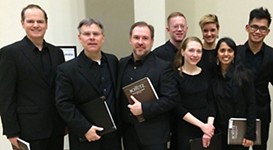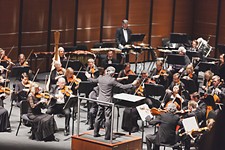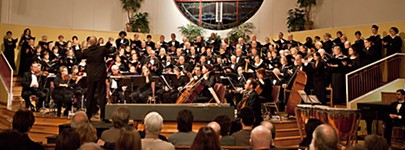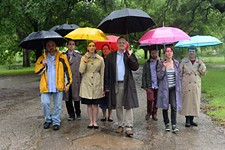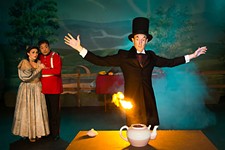Up at VIII
With its heartbeat pulsing at Austin's tempo, choral group Ensemble VIII continues to climb
By Adam Roberts, Fri., May 10, 2013
Eight voices. Each offers its own crystal clear, characteristic ring. Yet when their timbres combine, declaiming with excited animation the interwoven melodic lines distinctive of Renaissance vocal music, a magnificent synergy is realized. Take away any one voice, and the product is rendered incomplete. But take them together, and the resulting wash of vibrant tone colors, ultra-precise intonation, and oneness of sound is nothing short of world-class musicmaking.
This is Ensemble VIII.
After my initial experience with this Austin-based professional choral group last October, I was excited to sit down with company founder and Artistic Director Dr. James Morrow to discuss his perspectives on leading an early music ensemble in Austin, the trials and rewards afforded by that pursuit, and the group's preparations for its upcoming concert that will close Ensemble VIII's second season, featuring repertoire from the famed Eton Choirbook.
Austin Chronicle: First of all, how do early music ensembles tend to work, logistically speaking?
James Morrow: The world of professional early music singers is a pretty small community, and they travel around the world, so a lot of them are seeing each other in different ports, doing festivals and different groups. Professional musicians who are not full time with a symphony or don't have a full-time job travel all over – that's how they make their living. So it's very common that professional groups around the country have their roster come together for just a short amount of time to prepare a concert.
AC: Many of the performers on your roster hail from outside this area. So what makes Ensemble VIII a uniquely Austin entity?
JM: The vision is in Austin; the heartbeat is in Austin. These amazing singers are ready to get on a plane from Boston or New York City and fly to Austin. They love to come here. There is the vibe of Austin that is casual and hip, [and] they all are drawn to it, just like everybody is. They have such a great time when they come, and it's pretty magical, really.
AC: What accounts for that magic of an early music ensemble in Austin?
JM: I think it's a perfect fit. Austin, more so than most places, you think of as open-minded and savvy and smart and aware, so people love Willie Nelson and the Austin Symphony, and the same people love a lot of different art forms. That's one thing that really makes early music a great fit for Austin. [And the city] has a very developed and devoted base of people who love early music, a very passionate following.
AC: And how do you choose which repertoire you'll present to the city's early music aficionados?
JM: So far, we've had very focused programs – not narrow, but focused. Thus far, we've only done sacred repertoire, [and] we've only done Renaissance and baroque; that's where we live and what we want to do. From the beginning, an element of the yearning for this group was really spiritual. There was a strong draw for me to this enormous sacred repertoire that I love and that I find very moving and transformative for me as a person. And there is just so much repertoire one could try to get to, and I think that the spiritual nature of this Renaissance music [and] this glorious baroque music to me is a part of what I want Ensemble VIII to do and to bring to an audience. [But] it's not a part of our mission to do sacred music only. I'd love to do a semi-staged or concert version of a baroque opera. I think that's probably in our future somewhere.
AC: You're currently preparing for your upcoming concert, Blessed Mother, Eternal Spirit, featuring music from the Eton Choirbook. Tell me about that.
JM: The Eton Choirbook is very famous. [Choirbooks] were collections of sacred pieces, and the Eton Choirbook had about 90 in it. This is a big collection. And literally, [the choirboys] would all stand around this one book. It's a very famous repertoire. As I explored it while I was planning the season, I just thought it was spectacular music that we need to hear and that I need to do.
AC: What can audience members expect from this performance?
JM: This concert is repertoire that you rarely hear live, and unless someone is really a Renaissance CD devotee, they probably have never heard this music. It won't be shocking compared to what they might know as a reference to Renaissance polyphony, but it is a pretty rare opportunity to hear [it]. And it is special and spectacular repertoire. It's very tempting to think, "It's early Renaissance music, so it's not as good as late Renaissance music," which is not true. This music is as spectacular as [the music of] Josquin [des Prez] a couple of decades later or other late composers. It truly is sort of the culmination of late 15th century sacred polyphony. It's that kind of high quality.
AC: Tell me about the venue, St. Louis Catholic Church. You've chosen to perform most of your concerts there.
JM: The venue is absolutely critical to this repertoire, not unlike a great instrument. [The beauty of the] cello is not only [in] who plays it; it's [also] the wood. It's how it vibrates, it's the sound that's created. It's the richness of the sounds, and that is completely a marriage between the initiation of the sounds and [their resonance] in the space. So we were looking for what felt like the perfect place acoustically, but also visually, aesthetically – [that] would bring audience members into some kind of sanctuary, that would take them out of the norm of regular, everyday life and [into] a context that would prepare them for what they're going to hear. The space [where] we end up doing most of our concerts is St. Louis Catholic Church, the chapel there, which feels like home now.
AC: In general, what is the biggest challenge of developing a group like Ensemble VIII?
JM: The obvious challenge is financial; anything of high quality costs a certain amount of money. Getting something off the ground is no small feat, and we're doing it in a pretty significant way. We have a fantastic board that is extremely committed. We're building support from the city of Austin. It's happening. We would love to do some touring, no doubt about that. We'd like to make a lot of recordings. Right now, the main thing is to establish ourselves, build our base, and have a strong house, so to speak.
AC: And the greatest rewards?
JM: In addition to hearing the music, [it's] seeing the reaction. In a little room somewhere, we thought, "This is something that can be really powerful." [Then] you see that people are so moved by this music and by the quality of the voices and artistry. People's lives are changed for a moment. It is very palpable. The way that people walk out of those concerts, it's like their walking on air. It's very gratifying.
Ensemble VIII will perform Blessed Mother, Eternal Spirit: The Eton Choirbook on Friday, May 10, 7:30pm, at St. Louis Catholic Church Chapel, 7601 Burnet. For more information, see www.ensembleviii.org.






